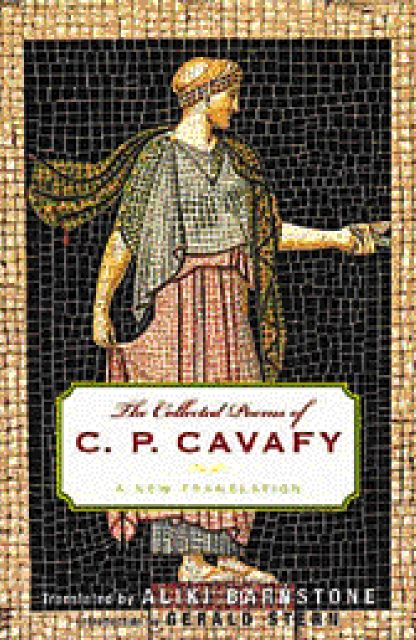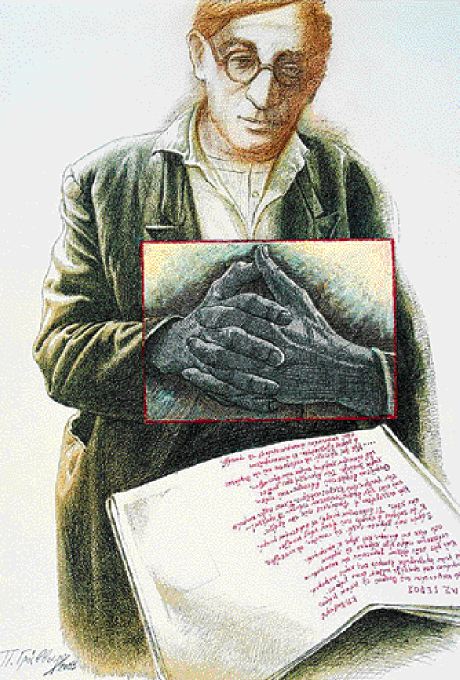 |
|
|
An Economical Cavafy |
|
|
A new translation of Cavafy has the virtue of efficiency, but is tin-earedto the rhythm and rhyme of the poetry by David Mason* Athens New For a poet who lived much of his life (1863-1933) in the imperial backwater of Alexandria, publishing his work in dribs and drabs, Constantine Cavafy has exerted an astonishing influence upon modern literature virtually everywhere. His uncanny integration of personal and historical subjects, his quiet scepticism and piercingly ironic wisdom somehow come across even to those who cannot read the original Greek. |
 |
|
WH Auden read early translations in TS Eliot's magazine, The Criterion, and later commended the versions of Rae Dalven. The South African novelist, JM Coetzee, borrowed Cavafy's most famous title, Waiting for the Barbarians. Such broad influence has run right up to contemporary American poets like Mark Doty, among many others. This is due not just to Cavafy's historical vision of far-flung empires, troubled Hellenism and Christian Rome, but also to his frankness about homosexual life, his dissection of moments in which both social transformation and personal exposure were (and are) most acute. His influence is all the more remarkable when you consider that, in English at least, Cavafy has never been perfectly rendered. The full texture and flavour of his poems have always escaped, and English readers typically make of Cavafy whatever they require for their own motives. Aliki Barnstone's honourable attempt at a new Cavafy is not helped when, in a brief foreword, the American poet Gerald Stern avows that Cavafy's style "is loose and idiomatic". This is nonsense - more descriptive of Stern than of Cavafy, who was meticulous in free verse as well as in rhyme. Barnstone's own introduction is closer to the mark. She understands the Greek poet's elegant irony, the ways in which his poems become unsuspected labyrinths. It must be said, however, that her versions of the poems themselves are far from definitive, rarely an improvement upon those by Edmund Keeley and Philip Sherrard, first published in 1975. The earlier volume is usually criticised for its lack of poetic flair, and Barnstone's job was precisely to bring that elusive quality to the poems. Instead, she has made clear, unobtrusive versions of such standards as "Ithaka" and "Kaisarion", but has not surpassed other translators - particularly James Merrill and Stratis Haviaras. To my knowledge, Merrill translated only four poems by Cavafy, but as an example of his deftness let me offer one line from "The Afternoon Sun", a poem describing the absent furnishings of a remembered room: "Poor things, they must be somewhere to this day." Barnstone's translation, on the other hand, conveys the meaning in flat-footed terms: "These sad things must still be somewhere." A similar stiltedness arises in the opening of "Thermopylae", which Barnstone renders as follows: "Honour to those who in their lives / demarcate and guard a Thermopylae." The assonance achieved does not compensate for the clumsiness of the word "demarcate". Keeley and Sherrard go for "define", while Memas Kolaitis says these people "have set themselves to guard Thermopylae" - a more vigorous image. Another comparison can be made between Barnstone's Cavafy and that of Stratis Haviaras, published in 2004. Consider his final stanza of "For Ammones, Who Died at 29 in 610 AD": |
|
|
Raphael, take care to compose your
verses in such a way that they reflect - well, something of our life in them, so that their rhythm, so that each and every phrase reveals that he who writes for an Alexandrian is Alexandrian, too. |
|
The little joke here is the use of the Alexandrine, a line with six stresses. Cavafy's originals are not so regular to my ear, but rich with sound play and even rhyme. Here is what Barnstone does with the stanza: |
|
|
Raphael, your verses should be
written so - you know - they embody something of our lives, so the rhythm and each phrase proclaim that an Alexandrian is writing for an Alexandrian. |
|
|
The trouble is, her lines do not embody anything special - they merely convey the meaning in economical terms. Cavafy's rhyming poems are especially difficult to translate. Kolaitis managed to catch the rhymes but with such contorted syntax that he sometimes made Cavafy an incompetent Victorian. Haviaras and others have had more success with the rhyming poems, but Barnstone does not even try - she simply turns them into the sort of free verse that allows Gerald Stern to make his lackadaisical assumptions about Cavafy's art. Greek is rhyme-rich in ways English is not; one must move from the morphology of one language to that of another, and this requires a deeper understanding of translation than most of us possess. |
|
|
The early poem called "Walls" conveys extraordinary things in only eight lines, partly by rhyming teihi (walls) with tyhi (fate or luck), so that walls are one's fate - not only the walls of a great city, but the mental, spiritual and social walls we construct. The poem also rhymes aitho (shame) with etho (here), so that "this place" equals "my shame". I could go on in this vein because the poem, which predates Robert Frost's "Mending Wall", is a little maze of meanings, some of them having to do with Cavafy's sexuality. What does Barnstone do? She conveys literal meaning gracefully, but nothing more, and she does the same with another famous rhyming poem, "The City". Aliki Barnstone's Cavafy is most adroit where the original is least challenging, yet she is better in some longish poems like "If Truly Dead" than in the very short poems where, if you're not careful, Cavafy can be read with a shrug. In a few cases, this |
 Cavafy's portrait by artist Panagiotis Gravallos |
|
volume shows signs of unfortunate haste. Her notes in the back are minimal, and her biography of the poet contains one example of incorrect usage ("was comprised of") and the erroneous assertion that Lawrence Durrell wrote Four Quartets. Where were her editors at Norton dining out when they should have been doing their job?
Finally, did we really need another Cavafy at this time? Only if it were better than Barnstone's and better than all previous versions. There are so many tremendous Greek poets crying out for able translators, and I am heartened by the news that WW Norton will someday publish a more comprehensive Greek anthology. Perhaps there we will at last come to understand what all these Cavafys mean. |
|
|
|
|
|
|
|
|
(Posting date 20 July 2006) HCS encourages readers to view other articles and releases in our permanent, extensive archives at the URL http://www.helleniccomserve.com/contents.html. |
|
|
|
|
2000 © Hellenic Communication Service, L.L.C. All Rights Reserved.
http://www.HellenicComServe.com |
|
